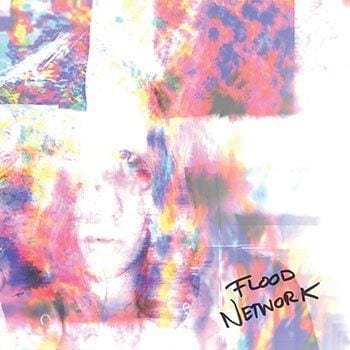
Fuzzy logic is a system of logic in which truth values exist between 0 and 1, the binary values that make up the better-known Boolean logic. This logic can be used to analyze propositions whose values change depending on the perspective; a popular and easy to grasp example is imagining a glass filled partially with water. The glass may either be x percentage full of water or y percentage empty of water, depending on the perspective, but so long as it is not entirely empty or full, the truth value exists between 0 and 1. In music, there long existed a binary relationship between the crispness of vocals and the instrumentation backing it, two factors that often danced parallel to but not with one another. Since debuting with the impressive, if at times uneven, asdfasdf, Katie Dey has proven herself a practitioner in music that can best be described as “fuzzy”. On Flood Network, her proper debut and first album for label Joy Void, she creates a fluid, insular world that is at once unrelenting and comforting.
In terms of constitution, the closest analogue to Flood Network released this year is Arca’s devastating Entrañas. Though Arca’s album traffics in continually punishing beats and samples that could spark endless dialogue, the two releases share a common theme in their distinct fluidity. Just as it is difficult and, presumably, unimportant, to tell where the songs change on Entrañas, Flood Network is completely linked to itself from start to finish. An instrumental follows up each track with vocals save for album closer “It’s Simpler to Make Home on the Ground”, and this pattern creates an interesting sonic synthesis.
Wherein most artists, if they are to return to earlier work on a later album, usually do so in the beginning stages of said album, Dey actually uses the back half of Flood Network to call back to choice tracks from asdfasdf. The halfway point of the album, “Fear O’ the Light”, is a direct reference to her first release’s “fear o the dark”. The latter track is built around a churning instrumental that meshes with her distorted, floating vocals like static slowly moving across a screen. The former, true to its title, is brighter in its composition, though its vocals, so kneaded into the instruments, could be hiding a more sinister tale. Two tracks later, “So You Pick Yourself Up” is titular and thematically similar to the standout closing song of asdfasdf, “you gotta get up to get up”. The bright, partially off-beat twinkling bells of “you gotta” is replaced by a somber, confident piano and its slower pace reveals a track as sure of itself as any she’s made.
This confidence also manifests itself in the way she’s chosen various instrumental flourishes that complete many tracks. asdfasdf, nearly completely devoid of bass, is shown progressed from within the first song, “All”, when it closes with bass rolls that, if taken without the spaces between them, could pass for having occurred in any number of death metal songs. Mostly, however, the influences are the usual suspects of the bedroom pop she’s grouped and has excelled with: (freak-)folk, whatever “indie” means today, and ambient. These converge like the glass being filled with water – Dey’s music isn’t 100% of any of these genres, but rather a faithful combination of and evolution from.
With an album so young, it’s hard to tell whether any of these songs will individually match the ebullience of “you gotta get up to get up”, a good a contender as any for her best song even after Flood Network. But one thing is certain: in the age of the surprise album, the mixtape-album, and the always-in-progress-album, Katie Dey has made that rare of beasts: the cohesive, complete, listen-all-the-way-through-or-you’re-missing-out album. It’s almost unfair that the bedroom pop, however accurate or beloved that title may be, movement is having the success it is, that there has yet to truly be a release from its ranks that has not been completely compelling. Listeners should be grateful, though, that many of this genre’s offerings are free, and those that are not are absolutely worth your money.
With two-thirds(!) of the year almost over, it’s never too early to start thinking about best-of lists. Though there’s no definite number-one like last year, the conversation is absolutely one with impressive depth to it. Flood Network, in its ability to be adaptable to any season, to any emotion, to any element of the human experience, has rightfully earned its place in this conversation. And at just over 30 minutes, there’s no excuse for not giving it a listen.


![Call for Papers: All Things Reconsidered [MUSIC] May-August 2024](https://www.popmatters.com/wp-content/uploads/2024/04/all-things-reconsidered-call-music-may-2024-720x380.jpg)



